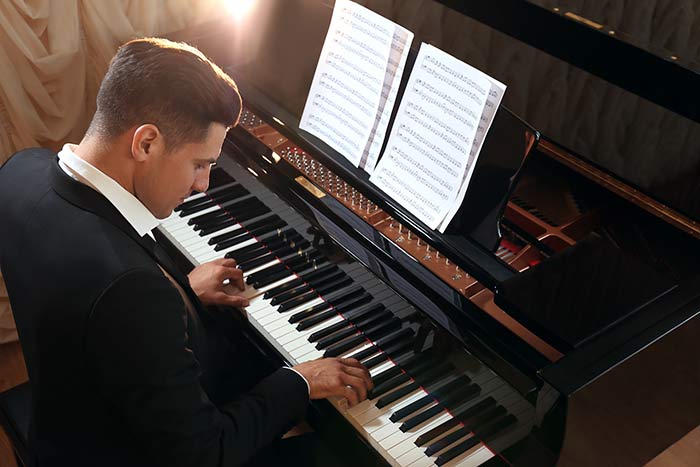There are different ways of memorising a piano piece.
The first is the normal memorising with your eyes, or what your eyes can see on your music score.
Memorising with your mind, thinking specifically what you are playing from your score.
Knowing what chords you are playing, knowing where you are going, seeing with your eyes and memorising that.
Then there is ear-memory, which according to me is the higher way of memorising a piano piece because you use your ear to hear the sounds, feel the music and remember the melodies etc.
For most classically trained pianists, reading a score is part of daily life and you use your eyes to read and memorise the music piece, although the ear is, of course, used, as we are busy with music.
But in ear-memory we mainly concentrate on the musical sound and melody which is easier to remember than written notes, as we are anyways busy with music which one hears with your ear.
Use your ears to memorise
“Ear memory” – doing it specifically as ‘ear-memory’ and concentrating on the ‘hearing’, is different from just memorising with the understanding of the mind because you are actually memorising with your ear how the music sounds, how the chord sounds, how the melody sounds, where it moves to and how it sounds.
It's like when people listen to songs or you listen to a piece of music that you know well by ear, your mind already knows where the melody is going and what's coming next etc.
This way for me personally is a much better way to memorise than just to memorise with the understanding.
It's a much deeper way of memorising if I can put it this way.
It's an area I only conquered much later in my musical career after I started to really work on playing by ear.
The first person that really confronted me with this concept was Stefan Joubert.
He said to remember that ear memory is more important than brain or eye memory!
At first I had no idea what he was talking about until I started to think about it and gave attention to memorising the sound of a specific chord or melody by ear – hearing really how it moves and sounds.
I started to memorise an old piece from years before which with my old eye or mind memory was lost.
Many a classical pianist find themselves years later not being able to remember the Bach or the Beethoven they knew so well, because of this very reason for shallow eye/brain memory used in learning it, instead of really committing the sound of the music or the melody or chords to your memory and having the link with the sound and the fingers.
It means that the piece of music was actually still on paper when committed to the mind but not in the ear.
Thus I was challenged to learn a piece in this newfound manner by sometimes looking at the music, but mainly just trying to remember the sound and working it out, or refreshing my old memory and replacing it with ear memory. I found that years later, I am still able to sit down and play the piece without trying to remember notes! It's as though the ear just brings it all back and places it under your fingers! Amazing! In this way, one does not forget how the piece sounds (like many of the songs people sing at pubs) – they just don't forget it because it's in their ear! Because its music and sounds, it's not so difficult to lose the ear memory as in when just trying to memorise notes.
With memorising from notes, one's head tends to want to think in pictures instead of sounds, while we are actually busy with sounds. When one then comes under pressure you tend to think, where am I now, on which page, which notes and it's easy to lose it, while with the ear or sound memory it leans on the remembrance of how it sounds and that makes it easy to remember and just play. So, in the end, it’s good to use both these ways of memory for the classical pianist. Use both of these principles in order to ensure a good memory. It will help you not to forget your piece so easily.
First of all if you want to memorise your piano score, you need to break up the piece into smaller sections to learn.
Some people memorise the piece because they played it for such a long time that they slowly start to remember it and eventually they feel they know it and it’s committed to their mind.
If you want to overtly memorise your piece so that you know that it's in your mind and you really know it – you will have to overtly, with specific intention have to study the piece and commit it to your memory.
When you get a new music piece I would advise the more advanced student to straight away learn the piece with the intention of committing it to memory immediately bit by bit, instead of first slowly working through the piece and then hopefully realising that you memorised it.
No.
Better to memorise with intent.
For the younger or less motivated student this might be a bit too much to think that one can from the first bar just start to memorise your piece from day one.
That's no problem, as long as you enjoy your music, this can come later.
For the advanced student or performer, memorising your music is not an option it is vital and just the beginning of performance.
A structure to breakdown and memorise your piano piece:
- Start your memorising with breaking up your piece in phrases or sections. You can study it bar by bar, or maybe better a few bars at a time. If there is a specific phrase, say from bar 1 to bar 4, start to memorise it up to the 1st beat of bar 5 so that there will be a natural link to start with for the next 4 bars or so.
- Break up your piece of music into sections like into A B C D sections etc. Then at your practice time, you can work on a section each day. Maybe on day 1 work on section A then the next day on section B the next day repeat section A and B.
This way you repeat and repeat, listen and listen and overtly think about memorising the notes, the sounds, the chords and the melody.
Some students learn pieces by first learning the right hand and then the left hand and then putting it together.
I do suggest that where applicable that you rather memorise the whole phrase as a whole.
It might be easier though in a Bach fugue, for instance, to learn the hands separately before putting it together with different phrases and voices that lead in melody.
The big thing is to do a little bit every day.
When memorising it's important to really put in the effort to think and make sure your fingering is absolutely correct. Listen very intently to the sound, the chords and the melody movement and try to commit that sound to memory as well.
The way memory works are by repetition and giving specific attention to what you are trying to memorise.
Concentration plays a great role.
For the student to memorise a piece, the motivation needs to be there.
Think of it this way.
Why memorise your piece of music?
Well it gives you a great, great edge just to be able to sit down and play a piece without having to look for your score – just to break down not remembering some of the score too.
It's best just to memorise it as it gives one a great freedom in performance and enjoyment of music.
You have made it your own.
Of course, it just takes hours of commitment and hard work, but it is well worth the effort.
Memory works like cutting a little line into a very hard stone.
One has to redo and redo and cut that little line very clearly into your memory until you know it's committed to your mind and its cut into the stone or your memory.
There is also ‘finger memory’ as in when one has seriously practised fast-moving runs for a long time, your fingers will automatically play the right notes without your thinking about it at all.
This memory helps a lot where muscles remember patterns. I discussed the use of metronome practises in an article on piano technique.
It's a must for finger memory as it gives you a structured way of repeating and memorising fast running passages.
If you are an advanced student the study of your piece – knowing what key it is in, what’s the timing, what form its composed in, like for instance if its a Sonata or a Fugue etc. and the chords used for the composition all help in a major way with memorising.
It gives you an overall perception of your piece you are playing.
Knowing the chord progressions and how the chords sounds is an amazing tool in memory – once again – ear memory.
For the advanced student knowing you are moving from tonic chord to sub-dominant and then to the dominant 7th or whichever chord – helps a lot in memorising and knowing your work well.
Now to come back to ear memory.
It's very important.
Not so much learning the notes as hearing and seeing the chord on which the music is based.
Hearing movement rather than thinking movement.
Instead of thinking with your mind where it goes to, you hear with your ear where the music goes to and your fingers follow suit.
With effort and concentration and serious bar to bar hard work and effort one can perfectly know your piece.
I don't know though if I can ever say that I came to this place of total perfection yet.
Memory is important, but in the end, the enjoyment and relaxing enjoyment of playing your piece is higher than having it perfect and never forgetting or losing a part of a piece.
Just learn to improvise and no one will even notice, except maybe the very critical classical ‘police’ looking for the smallest mistake one makes.
But for the very serious concert pianist or very serious performer, knowing your piece perfectly is an absolute must.
Memorising?
Yes!
Because you can memorise and do well.
I believe it's possible to reach this perfection.



